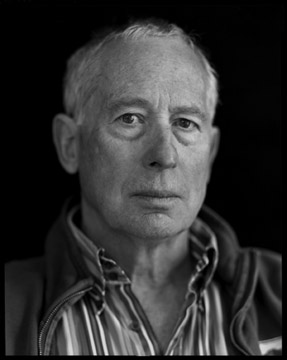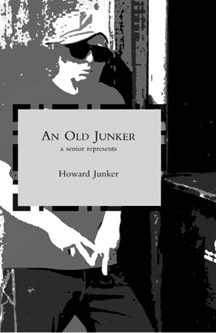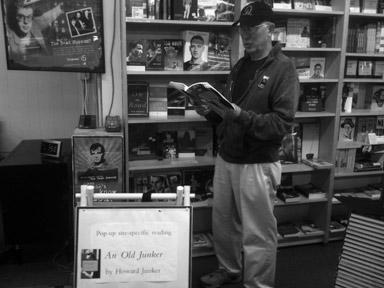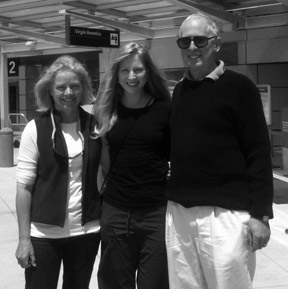


Howard Junker is a master editor. That is undeniable. In 1985, he founded the literary journal, ZYZZYVA. Practically a one-man show, he reigned over the publication until 2010, when he gave up the role to take his life in a new direction. We won’t use the word retirement here, because to us the word has no meaning. And now, in his new post-editor role, Howard Junker is a writer, blogger, teacher, and still as outspoken as ever. He recently published a book of his writings, entitled An Old Junker. Life has not slowed down for Howard. He is a combination of many men, but foremost, Howard is a family man and a friend to writers. We interviewed Howard recently to discuss a variety of subjects. Let’s see what he had to say.

THE WRITING DISORDER: What is your life like since you left ZYZZYVA?
HOWARD JUNKER: I've gone over to the dark side: I've become an author. So far I've done readings in a dive bar, a cafe, a bookstore, and the Conservatory of Flowers. I've really had fun stocking up my website, www.howardjunker.com, and making it the site of my new daily blog, which of course is now "branding" a lot of the time, with only a sprinkling of disinterested observations. Being out of the loop means that I don't have to keep up anymore, and I don't have to pay attention to all the careerists and wannabees I used to have to serve. But if I was marginal before, now I'm nowhere, which takes getting used to, but being hors de combat turns out to be liberating.
Of course, it's great to be 70 and publishing my first book. It reminds me of my greatest discovery, F.X. Toole, who was 69 when I bought his first story. Unfortunately, he died just before Clint Eastwood bought the rights that inspired "Million Dollar Baby." I see Harrison Ford as Old Junker. Redford might think he's right, but really he's too smarmy.
TWD: What do you read on a daily basis?
HOWARD: I like reading the classics these days, because I've been so focused on the contemporary. I especially like reading art history; currently, I'm into the Dutch & Flemish masters, at the moment, Seymour Slive on Frans Hals. I'm outraged that our local museum claims that its Portrait of a Gentleman is a Hals, whereas many, besides me, think it's more In the Manner of...
Last night, I finished David Remnick's Lenin's Tomb, which reads like ancient history. I'm trudging through Sister Miriam Joseph's The Trivium, a great exposition of grammar, logic, and rhetoric. I like combing the obituaries for writers I somehow missed, like Patrick Leigh Fermor, whom I love even more than Eric Newby, if that's possible. I love A Time of Gifts, about his walk when he was 18 from Holland to Constantinople—he didn't write the book until forty years later, so it's both incredibly romantic and innocent and terribly knowing and sophisticated.
TWD: Where did you learn to write?
HOWARD: The cute answer is: I'm still learning. But my first great learning experience was at Newsweek, in my late twenties, when as a fledgling I would sit across the desk from my senior editor, Jack Kroll, and watch him work on my copy. He showed me how's it done.
TWD: What books did you read as a kid?
HOWARD: My mom made me read one nonfiction (George Washington, Boy Surveyor) for every fiction (Mr. Midshipman Easy). My favorite book (of all time) is Skinny by James D. Adams, 1938. Skinny is a nice bad boy, a New England version of Penrod.

TWD: Tell us about your family life growing up. Were there other creative people in your life?
HOWARD: My mom, a kindergarten teacher, played the piano and sewed our pajamas and made gingerbread houses at Christmas. My father taught shop and remodeled houses for us to live in—eventually, he built one for us from scratch. He was a photographer, although he never got to do much while I knew him. His grandfather was a reporter/artist who came over from Germany in 1882 ... and visited Sitting Bull ... and San Francisco; Rudolf Cronau wrote several books about his adventures Out West and also about conservation, women's suffrage, and Columbus's landfall in the Caribbean. After my father died, when I was ten, a neighbor, who was a New York book editor, took me under his wing. I wanted to be him when I grew up.
TWD: Do you write at a specific time of day? What device do you use to write? Do you still
own a typewriter?
HOWARD: I write at all hours on an iMac. I like having a specific place to sit down to work—our basement. I don't have a typewriter anymore. I like adding links and videos to texts and I look forward to when it's easy to write e-books with all the bells and whistles.
TWD: Who reads your work first?
HOWARD: Nobody reads my work before I submit it to my editor. I guess I'm not into preliminary feedback.
TWD: Have you written any short stories or poetry?
HOWARD: I just published my first short story and have started submitting my second. I don't feel I'm much of a storyteller, so maybe I'll just walk away from the world of literature altogether.
TWD: Do you have any other creative talents—music, art, etc.?
HOWARD: I've tried my hand at installation/junk art, but the stuff began to accumulate and I couldn't figure out where to put it all. I included a few of my iPhotos in An Old Junker.
TWD: What do you like to do when you’re not working?
HOWARD: I play too much chess online; I'm both too impetuous and too careless to be any good. I like looking at painting. I love cooking and eating, although I hate foodieism. I don't really like swimming and pumping iron, but I like the way I feel afterwards. I've just started volunteering, but don't yet know where I'll find a fit.
TWD: What are your feelings about rejection
HOWARD: I'm against it. That's what I like about blogging: you can just put it up there.

TWD: Have you considered doing workshops or classes?
HOWARD: As an editor, I felt I had a lot to teach writers. The mechanics, to begin with. How to make a script better. But nobody ever asked me. As a writer, I have no idea. Inspiration is a mystery to me.
TWD: To what do you attribute your longevity as editor at ZYZZYVA?
HOWARD: Stubborness. Not knowing what else to do. Nobody else foolish enough to want the job.
TWD: What are the challenges of being an editor today versus five or ten years ago?
HOWARD: The biggest challenge is that the society continues to move toward untrammeled self-expression. Anybody can put it up on the Web. That's at one level; at a higher level there's more economic censorship than ever, more state control, less ability of "writers" to reach a larger audience. Also, because there's such a prejudice against the setting of standards, it's very hard to set up as an arbiter, even as a mash-up technician.
TWD: Which writers do you feel you’ve helped with their careers?
HOWARD: I'd like to think I helped everyone I published, even the great ones. I helped Milosz figure out the difference between two rivers' "effluence" and their "confluence." I loved giving 250 writers their first time in print; of these I guess the most famous was F.X. Toole, whose stories inspired Million Dollar Baby.
TWD: Are you advising any publications at this time?
HOWARD: Yes. I'm helping a startup in Santa Cruz called Catamaran. And I talk a lot with Evan Karp, who runs "Quiet Lightning," a reading series and magazine. And I bring writers to my publisher, IF SF Publishing.
TWD: I’ve always had the impression that you were a one-man show at ZYZZYVA, that you read everything sent in, and made all the selections. True or not, is it possible for one person to do that in today’s publishing world?
HOWARD: True. It's not that big a deal. It was possible only because no one else wanted to; it's feasible because I got only 70 or so manuscripts a week. Of them only a handful would merit close reading, and I'd buy maybe one. On the other hand, I don't believe in editing by committee, I believe in the singular vision. So ZYZZYVA expressed my sensibility, for better or worse.
TWD: What are three things you need to be a good editor?
HOWARD: A thick skin. Good fundamentals. Guts.
TWD: Which literary publications do you read regularly?
HOWARD: I read the NY Times, the Wall St. Journal, and the San Francisco Chronicle every day. The Economist and the The New Yorker every week. And then the New York Review of Books and the American Scholar, which my wife likes to subscribe to because she's a Phi Beta Kappa, too. Online I read Silliman's blog and Facebook posts; as well as Jane Ciabattari's posts on Facebook (she used to be president of the National Book Critics Circle and is constantly throwing up links. On the other hand, I don't try to keep up much any more; mostly, I read classics.
ISSUE:
W I N T E R
2011-2012
ART FEATURE:
An Introduction
to Deltiology
By accessing this site, you accept these Terms and Conditions.
Copyright © 2010-2012 TheWritingDisorder.com ™ — All rights reserved